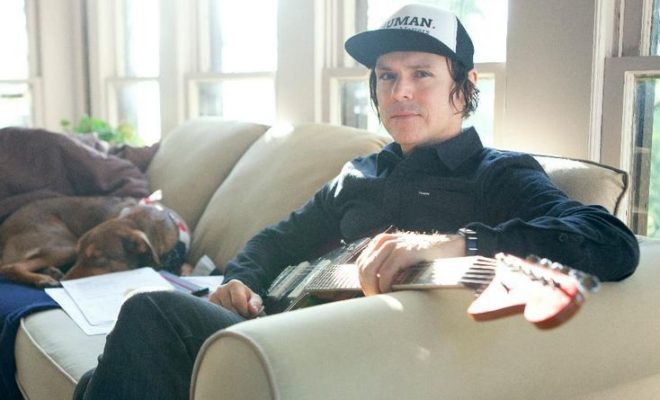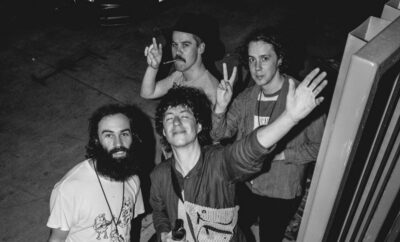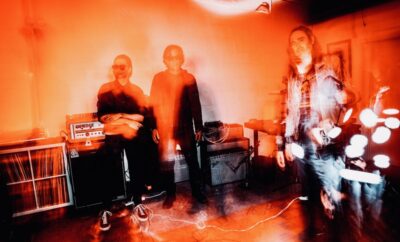 Stephanie Bujold
Stephanie Bujold
Interviews
Alex Henry Foster – Windows in the Sky
By: Mary Watkins
Q) How would you describe your sound?
A) That’s the ultimate tricky question for every artist! I think my sound would be post-rock, nu-prog, noise, and psych mixed with a lot of improvs. Think Nick Cave and Warren Ellis tagging along Michael Gira from Swans, Mogwai, Godspeed You! Black Emperor, King Crimson and Sonic Youth – all that under the direction of Glenn Branca… Something that elusive.
Q) When you are out playing your music people can tell your music has a lot of different influences and styles. Who would you say is your biggest influence?
A) Our biggest influence, even though people wouldn’t be able to pinpoint how much of an influence they are, would be the band Swans. Not so much musically than in terms of the spirit with which their songs are crafted. It’s this absolute freedom we are looking for. Everything needs to start from there. The total absence of creative boundaries and resilient determination to do whatever we want… that’s the real influence bands like Sonic Youth and artists like Nick Cave have on me.
Q) Your new song “Summertime Departures” is a very raw and emotional song. What made you decide you want to share that time of your life with your fans?
A) “Summertime Departures” is my way to say that regardless of what we may have spent our entire lives believing in or what we may have forgotten with time, there is a permanence amidst the most painful of all sorrows and our decision to let go in the acceptance that love, just like stone, will forever endure.
Q) Your track titled “The Love That Moves” sounds to me like it’s about crossing the other side in the end. What meaning does this song hold to you?
A) I guess the most complex element in a personal album such as “Windows in the Sky” is to avoid any self-consciousness on what we do by all possible means, which is almost impossible by definition but nonetheless necessary if we want those songs to grow beyond the words and sounds we dressed them with as we try and find a way to express emotions that are greater than our attempts at circumventing or understanding any of them. Again, I’d rather be honest than try and define anyone else’s perception. That’s why “The Love That Moves (The End Is Beginning)” has more to do with an intimate prayer than a well-designed mantra projecting what I would like to convince myself – or others – of. It’s my way of confessing what that journey has been, but even more to present who I became while going through it all.
Is grieving the ability to conquer darkness and make it shine? Is mourning the acceptance of the end that allows us to begin all over again? Is emotional emancipation no longer being afraid of losing what we never truly had in the first place? Maybe it is. Maybe it ain’t. But one thing for sure is that love moves, forgives, and heals… Way beyond any pale morning light or any dazzling make-believes.
Q) How did you come up with Windows in the Skyfor your first album name?
A) I was on the plane, totally exhausted, physically, emotionally and spiritually. I probably didn’t know how desperate I was at the time, which looking back was probably a good thing! I was looking by the window…I have always had a weird and creepy fascination in how far from the ground a plane can crash for everyone to survive and I have entertained that thought since I’ve seen a plane crash on TV as a young kid. So, I was looking at the cars and buildings getting smaller and smaller, until there was nothing left for me to see. I had the impression that somehow we were all, to some extent, a window in the sky… the sky being a template, a virgin canvas, even if only the reflection of something we can truly define when we take the time to contemplate no matter how elusive and inspiring it could be.
That idea, “Windows in the Sky,” is somehow something that I kept and I simply wrote on the cover of a notebook about to be endlessly tortured with sadness, sorrows, regrets, poems, prayers and letters…for months and then for the two years I finally spent in Tangier.
It’s only much later when I realized that all those words were more vivid than all the possible despair they were initially born from and stigmas of upcoming melodies that I knew “Windows in the Sky” was the perfect name for the album… Especially after trying to figure some smart ass type of album titles down… And I mean, who would have loved to close their eyes and listen to an album called 35,000 Feet High: The Story of a Free-Falling Panic Attack…
Q) What is it like doing your first solo album?
A) This album is my identity. I didn’t want the other members of the band to carry my stories. The passing of my father is the foundational narrative, so it was necessary for me to take ownership of those words and sounds rather than hide myself amidst a band.
Q) You decided to work on this album in Morocco. Why Morocco?
A) To be honest, I went to Tangier to lose myself, not to write or produce anything to be released after. It’s the city, its vibe, its people and its environment that slowly led me back into it, but with a totally renewed perspective on the “what I would do” and the “why I would do it.”
Q) What was the first song on this album you wrote?
A) “Snowflakes in July” came in the early stages of my journey in Tangier, little bits of the song at least. It’s about my father’s funeral and how I felt in the midst of it all. That was the beginning of the healing process for me.
Q) Where were you and what were you doing when you found out that your first solo album hit #1 on the Canadian iTunes Chart in “All Genres?”
A) I was back home in the Highlands of Virginia working on a movie score in my home studio. I realized something was going on when I started to receive inquiries for interviews from several mainstream national media. Let’s say I was a bit skeptical at first!
Q) What was it like for you performing your new song “Summertime Departure” and making the official video at the Montreal International Jazz Festival?
A) It’s kind of special to look back at it, as the Montreal International Jazz Festival was supposed to be the only concert I wanted to do with the album. I didn’t want to turn such an intimate record into an endless touring jukebox where the words and sounds would become background noises to the masses. Performing at the Jazz Festival was even more significant for me. My father was a huge fan of the festival and took me there when I was a kid. And since it was in my hometown and I had the privilege to honor him by playing the whole album in front of his friends and family, it gave that moment a more profound and solemn type of let go and heartfelt kind of emotional understanding.
Q) What is it like to be on tour? Your favorite part? Your least favorite part?
A) It’s always humbling to share those intimate moments with people. It’s always special, wherever we are in the world, even though I never felt comfortable on stage as it has never been natural for me to stand in front of people. It still feels awkward for me, especially that I now go under my name. I can’t hide within the concept of a band no more, but I’m nonetheless incredibly grateful to receive that tremendous support and that sincere affection night after night. It’s precious for so many different reasons.
Q) Who would you most like to collaborate with in the future?
A) There are so many! Nick Cave and Warren Ellis, Robert Smith, Mogwai, Guy Picciotto and Nick Zimmer are most definitely in my Top 10!
Q) What would you like to say to all your fans and supporters out there listening to your new album?
A) First and foremost, I would like to thank them for welcoming me in such a bleak emotional time. Everyone has been so generous with their support and affection. It gave me the courage to keep going, which is the reflection of the album’s nature and journey; let go and abandonment.





You must be logged in to post a comment Login